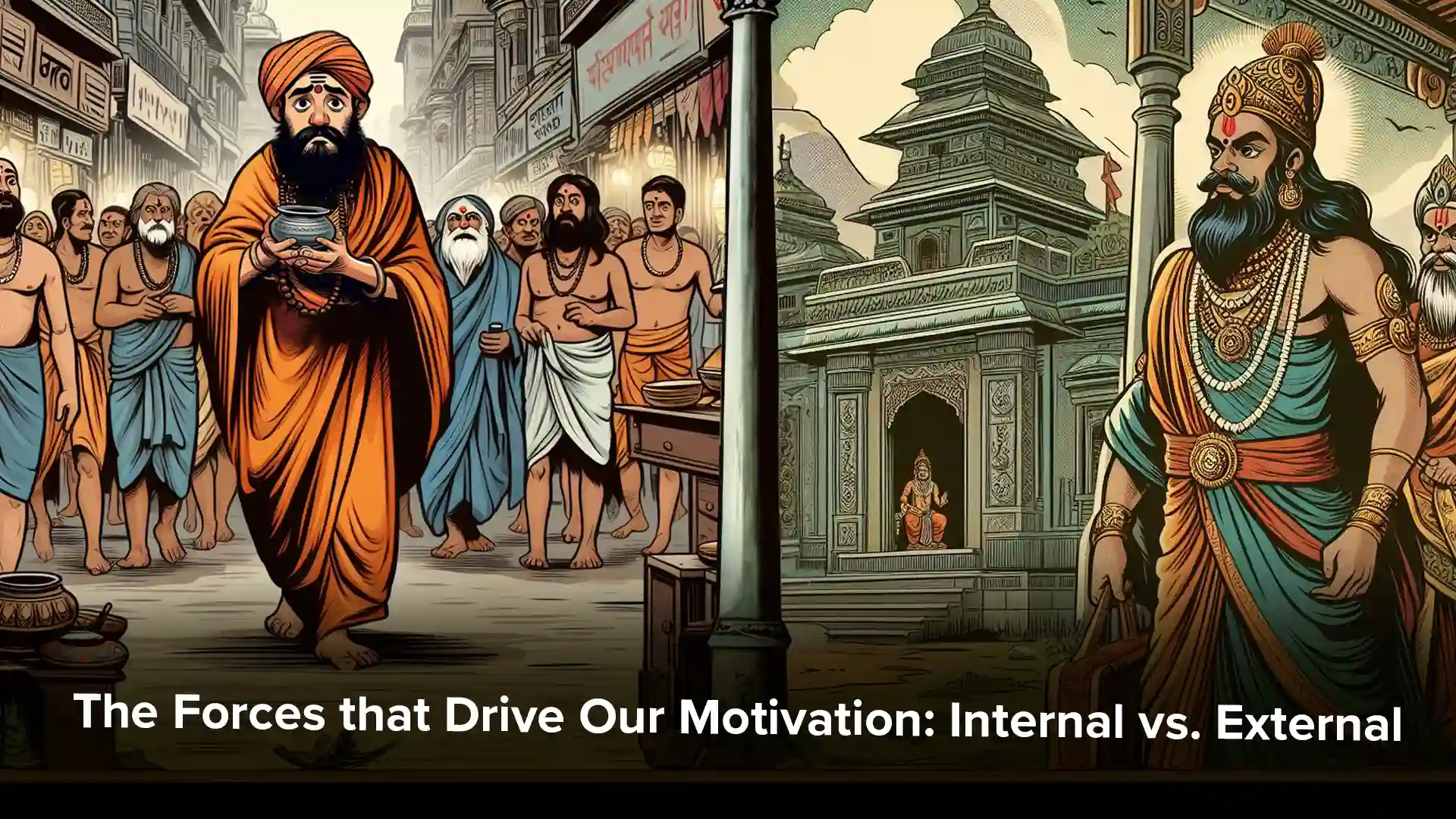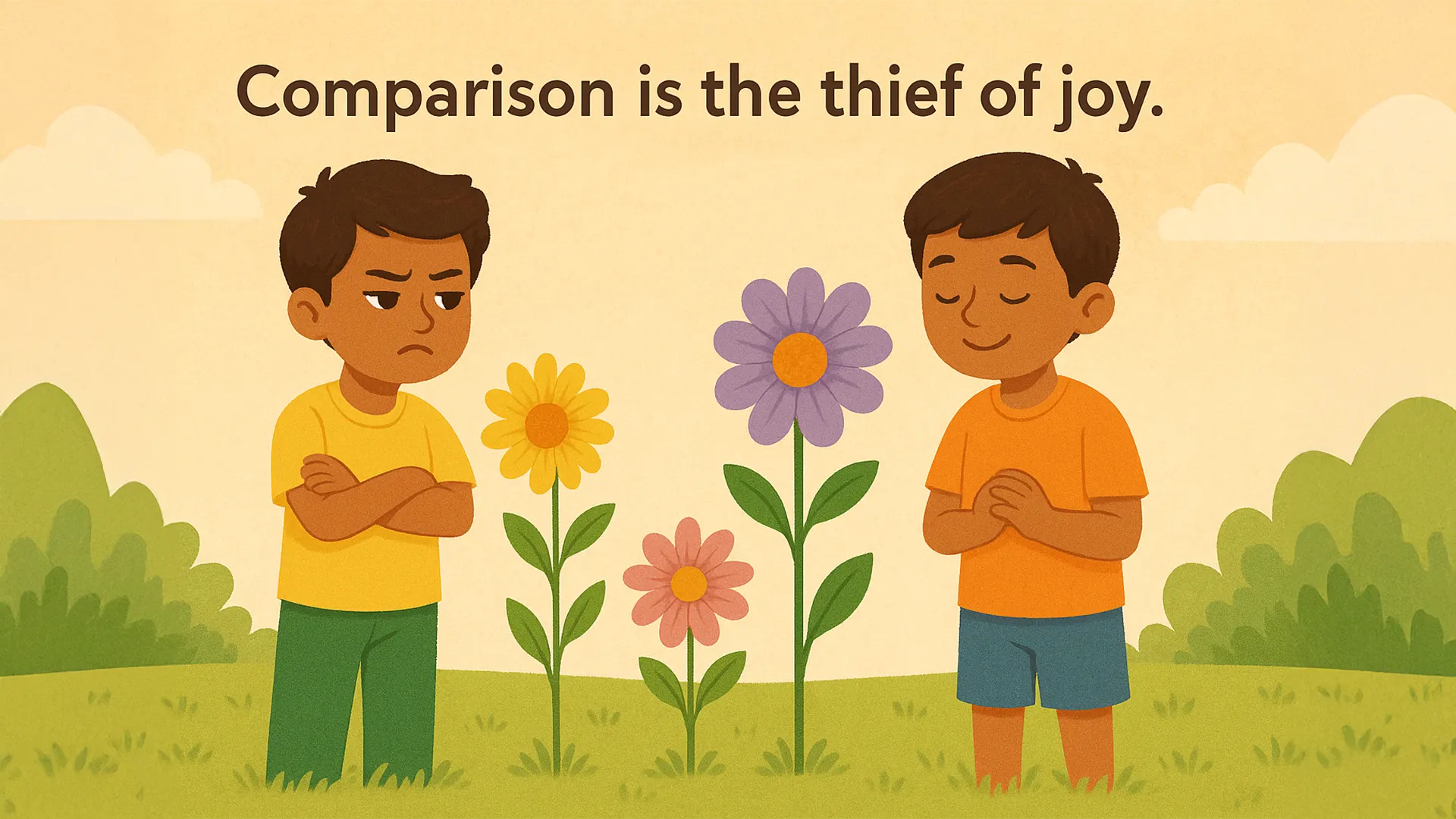This article delves into the intricacies of motivation and examines the two primary forces that propel us toward achieving our goals—external motivation, which is driven by external factors such as rewards or recognition, and internal motivation, which comes from within and is fuelled by our values, desires, and aspirations.
External Motivation: A Double-Edged Sword
External motivation stems from outside influences. For example, the praise from a boss or the reward promised for achieving a goal can compel us to work harder. While external motivation can be a helpful nudge, it has a critical flaw: dependence on external factors. Imagine the high of external motivation crashing down when the praise stops or the reward is elusive.
However, unlike external rewards or pressures, true inspiration stems from a wellspring of purpose within. As King Janak's story demonstrates, this intrinsic motivation fuels a laser focus that effortlessly cuts through distractions.
The Story of King Janak: A Lesson in the Power of Internal Motivation
King Janak's story exemplifies the power of inner inspiration leading to focus and detachment (vairāgya). Despite immense wealth, he remains unattached, earning the title "Videha"– one whose consciousness is beyond the body. One day, a few scholars come to his palace and question him on his detachment amid royal luxury. In return, Janak tasks them with carrying oil cups through bustling Mithila without spilling a drop. Failing to do so will result in them facing execution the next day.
Panic surges among the scholars. The city, buzzing with vibrant sounds and sights, becomes a potential threat. With laser focus, their eyes glued to the oil, the rhythmic slosh replaces everything else. Hours seem like an eternity of anxiety as they carefully tread on the street of Mithila, focusing solely on the oil-filled cup. As they complete the task successfully, hearts pounding, relief washes over them. Yet, Janak's next question sends shivers down their spines.
"Tell me, scholars," he booms, "what wonders did you witness in Mithila?"
The scholars could not say even a single thing about the city because their fear of impending death was so high that their intellect guided their minds with a single-minded focus on the oil-filled cup. Their fear transformed them into blindfolded pedestrians. This is the power of unwavering focus. When driven by a purpose stronger than distractions, we achieve mindful presence.
True inspiration lies within. It's about tapping into an inner wellspring fueled by actual knowledge (tattva-jñāna, तत्त्वज्ञान) from scriptures and Guru. Contemplating and internalising this knowledge empowers us to act with conviction and ignites intrinsic enthusiasm, allowing us to navigate the world with inspiration, focus and detachment.
Lesson from Swami Mukundananda's Life in Overcoming External Dependence
Swami Mukundananda's experience exemplifies the shift from external to internal motivation. When Swamiji was studying scriptures under his Guru Jagadguru Shree Kripaluji Maharaj's guidance, a hurdle emerged: He had no audience to practice public speaking, so he started practising lecturing to the walls of his room. The initial enthusiasm led to gnawing discouragement, as the walls couldn't give him the required feedback or response. Demotivated, he sought his Guru's counsel.
Kripaluji Maharaj, with a knowing smile, imparted a profound lesson. He didn't offer empty pep talks or suggest audience substitutes. Instead, he revealed the truth by quoting the Upanishad: inspiration and its evil twin, carelessness, resided not in the external world but within oneself. So, one should not look for external motivation but inner motivation.
Shree Kripaluji Maharaj quoted:
काममया एवायं पुरुष इति सा यथाकामो भवति तत्क्रतुर भवति।
यात्क्रतुर भवति तत कर्म कुरुते यत कर्म कुरुते तद अभिसम पद्यते॥
kāmamayā evāyaṃ puruṣa iti sā yathākāmo bhavati tatkartur bhavati।
yātkartur bhavati tatkarma kurute yat karma kurute tad abhisam padyate॥
(Brihadaranyaka upanishad 4.3)
Translation: "First, the desire arises in our minds, then our intellect inspires us to act to fulfil those desires. According to that inspiration, we perform actions, and as we perform actions, our destiny is shaped accordingly."
Kripaluji Maharaj's profound lesson – inspiration lies within – remotivated Swamiji.
Internal Motivation: The Power of Why
Internal motivation requires a strong "why." A deep conviction about the importance of a task fuels our inspiration. For instance, staying awake until 5 AM for a cherished goal feels significantly different from enduring a sleepless night due to external pressure.
इन्द्रियाणि पराण्याहुरिन्द्रियेभ्य: परं मन: ।
मनसस्तु परा बुद्धिर्यो बुद्धे: परतस्तु स: ।।
indriyāṇi parāṇyāhur indriyebhyaḥ paraṁ manaḥ
manasas tu parā buddhir yo buddheḥ paratas tu saḥ
(Bhagavad Gita 3.42)
Translation: "The senses are superior to the gross body and superior to the senses is the mind. Beyond the mind is the intellect, and even beyond the intellect is the soul."
The Bhagavad Gita's above quote emphasises that we can cultivate positive motivation within the mind by filling the intellect with valuable knowledge and convictions.
Let's try to understand the importance of "Why" through an analogy. Lalita, a dreamer trapped in textbooks, finds them dull. Worried, her parents seek guidance from Panditji. He asks Lalita, "Why stray from knowledge?" Lalita sighs, "Numbers and letters bore me!" Panditji explains, "If you fail your exams, you miss out on exciting new things next year. Your friends move on, leaving you behind." Dread fills Lalita. As exams approach, a change occurs. Focused like a rock, Lalita overcomes distractions. Her inner voice fuels her focus – the fear of failure and the desire to succeed. Lalita discovers a hidden power in the exam hall: controlling her mind with knowledge. Lalita's story reminds us that a strong "why" can tame even a scattered mind, and we can overcome any challenge with focus.
Control Mind Through Intellect
The ability to control the mind with intellect is a unique faculty bestowed upon human beings, not on animals. Animals are subject to the impulses of their senses and minds. Human beings can subjugate their lower instincts and live their lives by the values and beliefs of their intellect.
चेतसा सर्वकर्माणि मयि सन्न्यस्य मत्पर: ।
बुद्धियोगमुपाश्रित्य मच्चित्त: सततं भव ।।
chetasā sarva-karmāṇi mayi sannyasya mat-paraḥ
buddhi-yogam upāśhritya mach-chittaḥ satataṁ bhava
(Bhagavad Gita 18.57)
Translation: "Dedicate your every activity to Me, making Me your supreme goal. Taking shelter of the Yog of the intellect, keep your consciousness absorbed in Me always."
Our ability to control our minds hinges on the power of intellect. By filling our intellect, or buddhi, with the "right knowledge" – knowledge gained through reading, listening, and reflecting – we equip ourselves to make informed decisions. This knowledge guides our minds, aligning thoughts and actions with our goals and values. That is why Shree Krishna says to take shelter in Him, keep our mind absorbed in Him and the knowledge from Vedas so that our intellect is filled with true wisdom and we are motivated towards the correct destination.
True inspiration isn't a fleeting feeling; it's a continuous process. It requires us to consciously feed our intellect with knowledge that aligns with our long-term desires. This, in turn, fuels our intrinsic motivation and helps us find meaning in our pursuits. By consistently bridging the gap between knowledge and action, we can achieve a state of focused determination.









What our Participants say